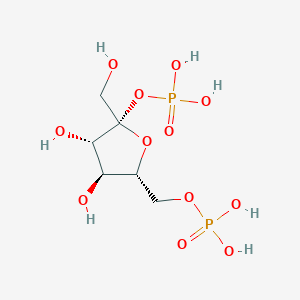Details of Metabolite
| Full List of Protein(s) Regulating This Metabolite | ||||||
|---|---|---|---|---|---|---|
| Growth factor (GF) | ||||||
| Transforming growth factor beta 1 (TGFB1) | Click to Show/Hide the Full List of Regulating Pair(s): 1 Pair(s) | |||||
| Detailed Information |
Protein Info
 click to show the details of this protein click to show the details of this protein
|
|||||
| Regulating Pair |
Experim Info
 click to show the details of experiment for validating this pair click to show the details of experiment for validating this pair
|
[1] | ||||
| Introduced Variation | Recombinant protein addition of TGFB1 | |||||
| Induced Change | D-Fructose 2,6-bisphosphate concentration: increase | |||||
| Summary | Introduced Variation
|
|||||
| Disease Status | Brain cancer [ICD-11: 2A00] | |||||
| Details | It is reported that recombinant protein addition of TGFB1 leads to the increase of D-fructose 2,6-bisphosphate levels compared with control group. | |||||
| Transferases (EC 2) | ||||||
| 6-phosphofructo-2-kinase/fructose-2,6-bisphosphatase 4 (PFKFB4) | Click to Show/Hide the Full List of Regulating Pair(s): 1 Pair(s) | |||||
| Detailed Information |
Protein Info
 click to show the details of this protein click to show the details of this protein
|
|||||
| Regulating Pair |
Experim Info
 click to show the details of experiment for validating this pair click to show the details of experiment for validating this pair
|
[2] | ||||
| Introduced Variation | Overexpression of PFKFB4 | |||||
| Induced Change | D-Fructose 2,6-bisphosphate concentration: increase | |||||
| Summary | Introduced Variation
|
|||||
| Disease Status | Breast cancer [ICD-11: 2C60] ... | |||||
| Details | It is reported that overexpression of PFKFB4 leads to the increase of D-fructose 2,6-bisphosphate levels compared with control group. | |||||
| Renal carcinoma antigen NY-REN-56 (PFKFB3) | Click to Show/Hide the Full List of Regulating Pair(s): 1 Pair(s) | |||||
| Detailed Information |
Protein Info
 click to show the details of this protein click to show the details of this protein
|
|||||
| Regulating Pair |
Experim Info
 click to show the details of experiment for validating this pair click to show the details of experiment for validating this pair
|
[3] | ||||
| Introduced Variation | Overexpression of PFKFB3 | |||||
| Induced Change | D-Fructose 2,6-bisphosphate concentration: increase | |||||
| Summary | Introduced Variation
|
|||||
| Disease Status | Healthy individual | |||||
| Details | It is reported that overexpression of PFKFB3 leads to the increase of D-fructose 2,6-bisphosphate levels compared with control group. | |||||
If you find any error in data or bug in web service, please kindly report it to Dr. Zhang and Dr. Mou.

